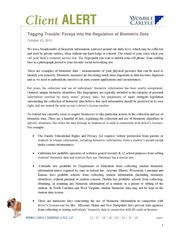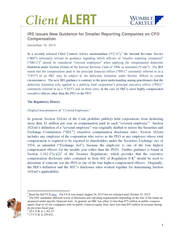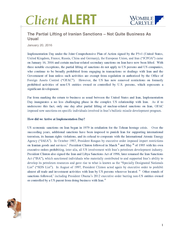Business Judgment Rule Rebutted When Bank Officers Failed to Follow Procedures – December 28, 2015
Womble Carlyle Sandridge & Rice
Description
5353 Wayzata Blvd., Suite 600, Minneapolis, MN 55416
Calendar of Events
December 2015 Vol. XXVIII Number 12
ï„‘
ï„‘
*Many Chapter event dates will be finalized and reported in future issues. You can also visit the PLUS website to view the most up-to-date information.
Chapter Events*
Eastern Chapter
Northern California Chapter
l December
l December
9, 2015 • Winter Social • New York, NY
Hartford Chapter
l January
2015 • Networking Reception • Hartford, CT
Mid-Atlantic Chapter
l December
3, 2015 • Educational Seminar and Holiday Party • Philadelphia, PA
Midwest Chapter
l December
8, 2015 • Holiday Party • Chicago, IL
2, 2015 • Educational Seminar w/ IIABKC • Seattle, WA
Southeast Chapter
l December
l December
2015 • Sponsor Appreciation and Networking Reception • Birmingham, AL
10, 2015 • Holiday Party • Los Angeles, CA
Southwest Chapter
2, 2015 • Holiday Party • Boston, MA
l December
North Central Chapter
l December
l December
Southern California Chapter
New England Chapter
l December
10, 2015 • Holiday Party • San Francisco, CA
Northwest Chapter
2, 2015 • Educational Seminar • Minneapolis, MN
10, 2015 • Networking Reception • Denver, CO
Texas Chapter
l December
2, 2015 • Sponsor Appreciation and Networking Reception • Dallas, TX
International Events
2016 D&O Symposium
2016 Cyber Symposium
l February
l September
3-4, 2016 • Marriott Marquis • New York, NY
26, 2016 • New York, NY
2016 MedPL/PRS Symposia
2016 PLUS Conference
l April
l November
20-21 2016 • Chicago, IL
9-11, 2016 • Hyatt Regency • Chicago, IL
As a nonprofit organization that provides industry information, it is the policy of PLUS to strictly adhere to
all applicable laws and regulations, including antitrust laws. The PLUS Journal is available free of charge to
members of the Professional Liability Underwriting Society.
Statements of fact and opinion in this publication are the responsibility of the authors alone and do not imply an opinion on the part of the members, trustees, or staff of PLUS. The PLUS Journal is protected by state and federal copyright law and its contents may not be reproduced without written permission. reduce re le cyc The mission of the Professional Liability Underwriting Society is to be the global community for the professional liability insurance industry by providing essential knowledge, thought leadership and career development opportunities. r eu s e THANK YOU, DIAMOND SPONSORS! The PLUS Journal is printed on recycled paper. PLUS Professional Liability Underwriting Society 5353 Wayzata Blvd., Suite 600 Minneapolis, MN 55416-4758 phone 800.845.0778 or 952.746.2580 www.plusweb.org .
Statements of fact and opinion in this publication are the responsibility of the authors alone and do not imply an opinion on the part of the members, trustees, or staff of PLUS. The PLUS Journal is protected by state and federal copyright law and its contents may not be reproduced without written permission. reduce re le cyc The mission of the Professional Liability Underwriting Society is to be the global community for the professional liability insurance industry by providing essential knowledge, thought leadership and career development opportunities. r eu s e THANK YOU, DIAMOND SPONSORS! The PLUS Journal is printed on recycled paper. PLUS Professional Liability Underwriting Society 5353 Wayzata Blvd., Suite 600 Minneapolis, MN 55416-4758 phone 800.845.0778 or 952.746.2580 www.plusweb.org .









